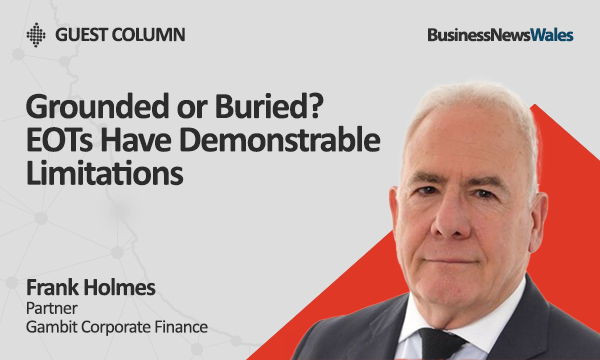
If we want growth, we must make Wales investable. That means viewing Wales not as a region in need of support, but a country of strategic opportunity, one where public and private capital can unlock long-term, sustainable returns.
This requires a new mindset across all levels of government and sectors.
It also requires a skillset to overcome the capability deficit. You cannot just flick a switch and expect competency at initiatives that are new, higher risk and require business-like discipline to engage with pension funds, green finance and private infrastructure funds.
We desperately need integration between UK, Welsh and local government, between business, academia and social enterprise and, crucially, between our digital and physical infrastructure systems. The future prosperity of Wales will depend on how well we join the dots and break down the silos. We need an integrationist mindset.
If we are intent upon answering our most serious questions, from productivity, poverty, health, climate change, education and skill requirements, to highlight a few, we also need to involve people who think differently, not just accurately, adopting a holistic perspective through collective intelligence.
The use of focus groups, a much vaunted solution to a lack of diversity, in politics, while sensible in their own terms, miss the deeper point because it is about the questions that are asked in the first place, the data that is used and the assumptions that permeate the problem areas. With complex problems, no one person will have all the relevant insights.
What’s needed now is leadership on both sides. Political leaders willing to open the tent, build trust and co-create the future with business leaders ready to move from critique to collaboration and embrace the positive attributes of the public sector.
The fundamentals are there. We have world-class research institutions, a proud manufacturing base, and a rising innovation ecosystem. But our success is being held back by fragmentation of funding, of governance, and of ambition.
We need a national approach to investment readiness, one where policy, infrastructure and financial mechanisms work in tandem to lower the barriers to attract international mobile capital.
A mere shift from pointing our own lens from East to West lands us in Ireland, a country that has experienced an amazing transformation. Fiscal benefits aside, we could learn from the Celtic Tiger’s enviable ability to attract and retain foreign investors.
The Welsh and UK Governments have a vital enabling role to play here, not simply as regulators or grant-givers, but as strategic investors willing to de-risk transformational projects. That means moving away from a narrow focus on tax revenue towards an Entrepreneurial State model that rewards responsible, not reckless, risk-taking and value creation.
Incentivising investment through targeted tax reductions, investment zones, and agile planning frameworks will send a powerful signal to global capital, financial and corporate investors.
Government needs to trust and release the regions and other local institutions to develop tax incentives and fiscal levers to give bespoke benefits back to business and create a magnet for inward investment.
At the same time, we must align the funding flows that already exist. Sovereign funds, infrastructure impact investors, local authority pension funds – these pools of capital can be brought together under a shared purpose to invest in the future economy of Wales.
Whether it’s renewable energy, smart mobility, advanced manufacturing, creative industries or health innovation, we must package these opportunities in a way that speaks the language of investors.
We also need to think spatially. Our transport and digital networks are not just enablers of movement or communication, they are the arteries of economic vitality. A joined-up connectivity strategy, linking less prosperous economic zones with research assets and job creating communities, is vital if we want to create investable regions, not just isolated projects.
This is not about grand gestures or top-down declarations. It’s about building the architecture that allows ambition to scale locally, nationally, and internationally. That requires a coalition of actors prepared to work across boundaries, share risk and reward, and stay focused on long-term outcomes.
The opportunity is clear. Business leaders across Wales, representing sectors from manufacturing, media, energy generation to the digitisation of everything and logistics, have called for a new manifestation of politics: one that listens, collaborates, and moves at the speed of change.
In parallel, many within our political institutions recognise that governing in silos is no longer enough. What’s missing is a mechanism to merge these ambitions in a way that is transparent, accountable, and bold. The UK Industrial Strategy has an overdue role to drive this very opportunity.
This isn’t about privatising policy or diminishing the role of elected representatives. It’s about enhancing public decision-making with the same tools that drive great businesses: data, delivery, and discipline.
From AI-powered analysis of emerging trends to cross-sector innovation through procurement, the methods that fuel private sector progress can and should inform public sector reform.
Diversity is the basic ingredient of collective intelligence and has moved to the heart of artificial intelligence. For policy makers, it emerges from exceptional individual politicians with (amongst other things), backgrounds that span the demographic spectrum of the electorate they serve.
Then there’s investment. Wales competes globally for talent, capital, and opportunity. To win, we need an integrated strategy that leverages public infrastructure and private ambition in tandem. A shared economic vision between political leaders and a dedicated business advisory group with authority could create a powerful new offer to investors, rooted in stability, coherence, confidence and language that is trusted and understood by all stakeholders.
Wales can become investable. But only if we act with purpose, speak with one voice, and design the systems that attract not just support capital, but foster innovation and talent.
The stakes are high. We are seeing the end of stability, certainty and abundance with the potential end of globalisation driven by patriotism and potential war conflicts.
Therefore, we must focus on the nation-state level productivity and prosperity, while the rest of the world is onshoring, developing tax incentives and imposing damaging tariffs aimed at sovereign capability. This is our competition.
So too is the potential. If we are serious about building a more prosperous, dynamic, and inclusive Wales, then the next chapter of our politics must be written together with business not as a stakeholder, but as a true partner.






